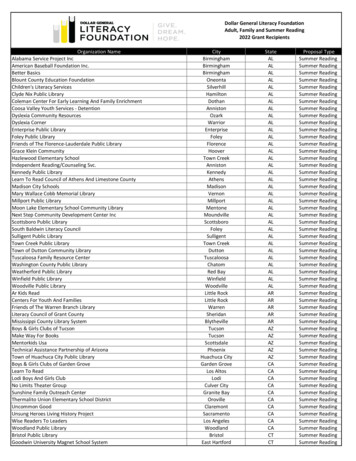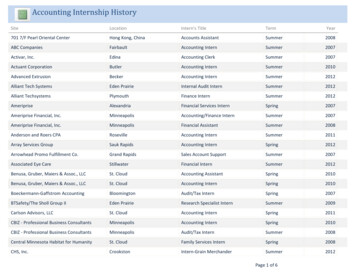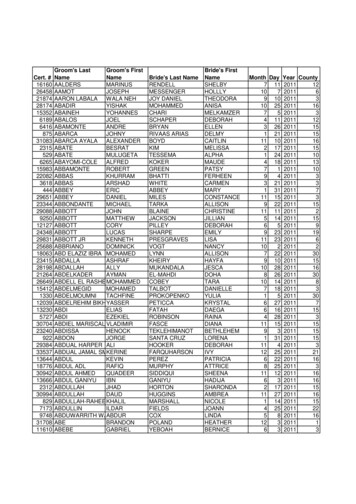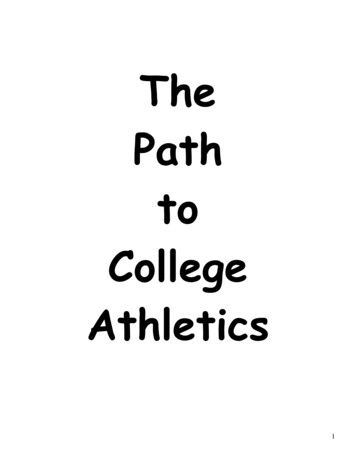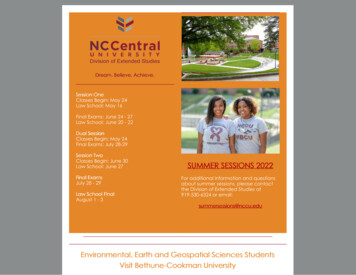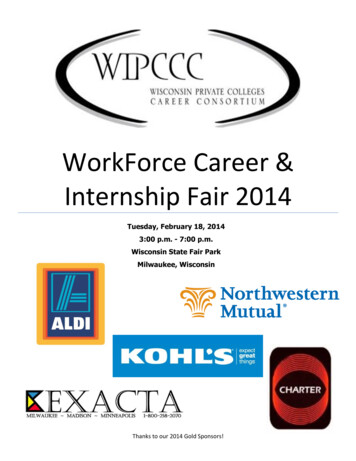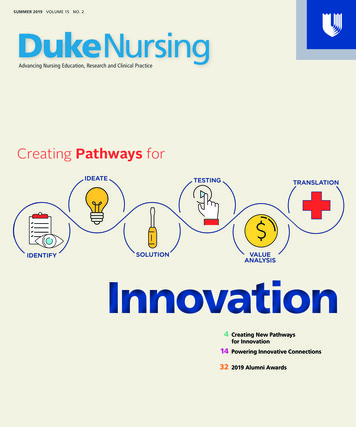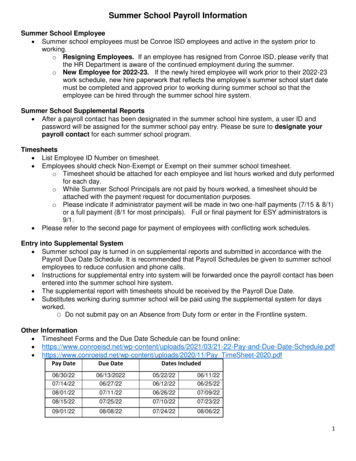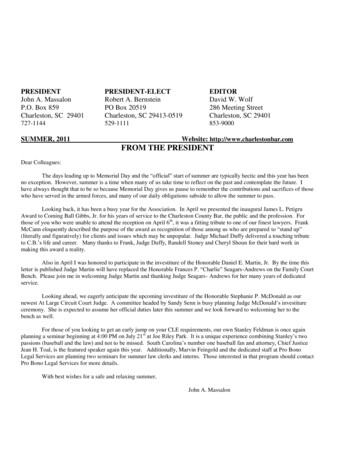
Transcription
PRESIDENTJohn A. MassalonP.O. Box 859Charleston, SC 29401PRESIDENT-ELECTRobert A. BernsteinPO Box 20519Charleston, SC 29413-0519EDITORDavid W. Wolf286 Meeting StreetCharleston, SC 29401727-1144529-1111853-9000SUMMER, 2011Website: http://www.charlestonbar.comFROM THE PRESIDENTDear Colleagues:The days leading up to Memorial Day and the “official” start of summer are typically hectic and this year has beenno exception. However, summer is a time when many of us take time to reflect on the past and contemplate the future. Ihave always thought that to be so because Memorial Day gives us pause to remember the contributions and sacrifices of thosewho have served in the armed forces, and many of our daily obligations subside to allow the summer to pass.Looking back, it has been a busy year for the Association. In April we presented the inaugural James L. PetigruAward to Coming Ball Gibbs, Jr. for his years of service to the Charleston County Bar, the public and the profession. Forthose of you who were unable to attend the reception on April 6 th, it was a fitting tribute to one of our finest lawyers. FrankMcCann eloquently described the purpose of the award as recognition of those among us who are prepared to “stand up”(literally and figuratively) for clients and issues which may be unpopular. Judge Michael Duffy delivered a touching tributeto C.B.’s life and career. Many thanks to Frank, Judge Duffy, Randell Stoney and Cheryl Shoun for their hard work inmaking this award a reality.Also in April I was honored to participate in the investiture of the Honorable Daniel E. Martin, Jr. By the time thisletter is published Judge Martin will have replaced the Honorable Frances P. “Charlie” Seagars-Andrews on the Family CourtBench. Please join me in welcoming Judge Martin and thanking Judge Seagars- Andrews for her many years of dedicatedservice.Looking ahead, we eagerly anticipate the upcoming investiture of the Honorable Stephanie P. McDonald as ournewest At Large Circuit Court Judge. A committee headed by Sandy Senn is busy planning Judge McDonald’s investitureceremony. She is expected to assume her official duties later this summer and we look forward to welcoming her to thebench as well.For those of you looking to get an early jump on your CLE requirements, our own Stanley Feldman is once againplanning a seminar beginning at 4:00 PM on July 21 st at Joe Riley Park. It is a unique experience combining Stanley’s twopassions (baseball and the law) and not to be missed. South Carolina’s number one baseball fan and attorney, Chief JusticeJean H. Toal, is the featured speaker again this year. Additionally, Marvin Feingold and the dedicated staff at Pro BonoLegal Services are planning two seminars for summer law clerks and interns. Those interested in that program should contactPro Bono Legal Services for more details.With best wishes for a safe and relaxing summer,John A. Massalon
ANNOUNCEMENTSStephanie M. Brinkley announces the opening of Brinkley Law Firm, LLC. The practice focuses on assisted reproductiontechnology, home preservation (loan modification/foreclosure defense), and traditional family law issues. The office islocated at 1180 Sam Rittenberg Blvd., Ste. 200, Charleston, SC 29407. Phone (843) 227-9009; Fax (888) 977-9402; Emailsbrinkley@brinkleylawllc.com.Mark Clore takes pleasure in announcing the formation of Clore Law Group, LLC. He will be joined by Samuel K.Allen, Eric S. Brock and John P. Hayes. (formerly of Anastopoulo & Clore Law Firm, LLC)/ The firm focuses oncomplex and serious civil litigation, and works with other counsel across the country in these cases. They are located at 49Immigration Street, Suite 100, Charleston, SC 29403. Telephone: (843) 722-8070; Fax: (843) 722-9881.C. Steven Moskos has been certified as a Circuit Court Mediator by the South Carolina Board of Arbitrator and MediatorCertification. His contact information is 535 Stinson Dr., Charleston, SC 29407. Phone (843)-763-5297; Fax: (843) 2661925; E-Mail: csmoskos@earthlink.netSusan Sytner announces the opening of the Sytner Law Firm, LLC. The practice focuses on all aspects of traditionalfamily law, as well as mediation and private Guardian ad Litem work. The office is located at 1180 Sam Rittenberg Blvd.,Ste. 200, Charleston, SC 29407. Phone (843) 277-9010; Fax (843) 277-6774; Email susansytner@gmail.com.IMPORTANT REMINDEREffective April 1, the contact information for Julianne Holzel, Executive Secretary for the CharlestonCounty Bar Association was changed as follows:Telephone number: (843) 881-6666E-Mail: jholzel2@comcast.netMailing address remains the same:PO Box 21136Charleston, SC 29413Please remember to send any changes in your contact information (address, telephone number, e-mailaddress, etc.) to the above e-mail address so that your mail will not be returned to us and you will receiveall notifications sent out via e-blast.ONLINE MEMBER DIRECTORYPlease help us have a more complete online member directory. If you go to the LawyerDirector on http://www.charlestonbar.com and see that any of your contact informationand/or headshot is missing, or outdated, please e-mail the information and photo (in jpegformat) to jholzel2@concast.net. We will add the new information to the website asquickly as possible. This is especially important for new members.2
Our Sincere Appreciation and Thanks to Mia ManessIt is with great regret and sincere appreciation that we bid farewell to Mia Maness as the editor of this newsletter.Shakespeare must have anticipated Mia’s service as editor when he penned the line that “some are born great, some achievegreatness, and others have greatness thrust upon them.”Mia was born great. She has a keen intellect, a diligent work ethic, a great sense of humor and a contagiousenthusiasm that she brings to every task, including her service as editor.After growing up in Spartanburg, she began to achieve excellence. Mia received a B.A. from the University ofSouth Carolina magna cum laude in 1985, and a Juris Doctor degree from that same institution in 1988. She was introducedto the Charleston Bar as a law clerk to the Honorable C. Weston Houck, where she served with distinction from 1988 to1991. At that time, she accepted a position with Holmes & Thomson and she remained there until 1999. Mia thentransferred to the Law Office of Mark Tanenbaum, PA. She left that firm in 2005 to accept a partnership with Kernodle,Taylor & Root, but she returned to the Tanenbaum firm in 2007 and she has remained there ever since. While building hercareer, Mia also built a solid reputation as a vigilant, ethical advocate of the highest caliber.Mia had greatness thrust upon her when she succeeded Danny Mullis as the editor of this newsletter. She wasofficially listed as the editor in the spring 1997 edition. However, prior to that Mia provided a significant contribution to thenewsletter during her apprenticeship with Danny. Mia had the following to say when we asked her about her tenure aseditor:Our newsletter is a wonderful resource for keeping up with the Charleston legal community and courts. Because Ihad to read everything that went into it, there’s not much that’s happened over the years that’s gotten by me.Although at times it has been a lot of work, editing the newsletter has given me a strong sense of this communityand the way that juries behave in this jurisdiction. It’s been a good trade off for me and I hope my contribution tothe newsletter has benefited the bar.While we hate to see Mia’s time as editor come to an end, we are thankful for her service and all that she has donefor the Charleston County Bar Association. After more than fifteen years of faithful service, she has more than earned abreak. She has also earned our respect and admiration.3
JUDICIAL NOTICEForeword by Brian DuffySixty years ago this June 21st, The Honorable J. Waties Waring issued the most notable opinion in the history of our fourcorners of law. As the dissenter on a three-judge panel that rejected a challenge to the constitutionality of South Carolina’ssegregated school system in Briggs v. Elliot, 98 F. Supp. 529 (E.D.S.C. 1951), Judge Waring became the first jurist to declarethat segregation itself was unconstitutional, irrespective of the relative quality of the separate school systems.The significance of Judge Waring’s dissent, the expert testimony received in the ceremonial courtroom of our federalcourthouse, and the courage of the Clarendon community that pressed this action was revisited recently in compelling fashionin that very courtroom during a colloquium presented (and videotaped) by the South Carolina Supreme Court HistoricalSociety on May 20.In further reflection on that moment in our history, we reprint selected portions of Judge Waring’s emphatic opinion below:DISSENTING OPINIONThis case has been brought for the express and declared purpose of determining the right of the State of South Carolina, in itspublic schools, to practice segregation according to race.It is alleged that the defendants are acting under the authority granted them by the Constitution and laws of the State of SouthCarolina and that all of these are in contravention of the Constitution and laws of the United States. The particular portions ofthe laws of South Carolina are as follows:Article XI, Section 5 is as follows:‘Free public schools.- The General Assembly shall provide for a liberal system of free public schools for all childrenbetween the ages of six and twenty-one years * * *.’Article XI, Section 7 is as follows:‘Separate schools shall be provided for children of the white and colored races, and no child of either race shall everbe permitted to attend a school provided for children of the other race.’Section 5377 of the Code of Laws of South Carolina is as follows:‘It shall be unlawful for pupils of one race to attend the schools provided by boards of trustees for persons of anotherrace.’.The case came on for a trial upon the issues as presented in the complaint and answer. But upon the call of the case,defendants’ counsel announced that they wished to make a statement on behalf of the defendants making certain admissionsand praying that the Court make a finding as to inequalities in respect to buildings, equipment, facilities, curricula and otheraspects of the schools provided for children in School District 22 in Clarendon County and giving the public authorities timeto formulate plans for ending such inequalities. In this statement defendants claim that they never had intended todiscriminate against any of the pupils and although they had filed an answer to the complaint, some five months ago, denyinginequalities they now admit that they had found some; but rely upon the fact that subsequent to the institution of this suit,James F. Byrnes, the Governor of South Carolina, had stated in his inaugural address that the State must take steps to providemoney for improving educational facilities and that thereafter, the Legislature had adopted certain legislation. They statedthat they hoped that in time they would obtain money as a result of the foregoing and improve the school situation.This statement was allowed to be filed and considered as an amendment to the answer.By this maneuver, the defendants have endeavored to induce this Court to avoid the primary purpose of the suit. And if theCourt should follow this suggestion and fail to meet the issues raised by merely considering this case in the light of another‘separate but equal’ case, the entire purpose and reason for the institution of the case and the convening of a three-judge courtwould be voided. The 66 plaintiffs in this cause have brought this suit at what must have cost much in effort and financialexpenditures. . . . And in addition to all of this, these 66 plaintiffs have not merely expended their time and money in order totest this important Constitutional question, but they have shown unexampled courage in bringing and presenting this cause attheir own expense in the fact of the long established and age-old pattern of the way of life which the State of South Carolinahas adopted and practiced and lived in since and as a result of the institution of human slavery.4
If a case of this magnitude can be turned aside and a court refused to hear these basic issues by the mere device of admissionthat some buildings, blackboards, lighting fixtures and toilet facilities are unequal but that they may be remedied by thespending of a few dollars, then, indeed people in the plight in which these plaintiffs are, have no adequate remedy or forum inwhich to air their wrongs. If this method of judicial evasion be adopted, these very infant plaintiffs now pupils in ClarendonCounty will probably be bringing suits for their children and grandchildren decades or rather generations hence in an effort toget for their descendants what are today denied to them. If they are entitled to any rights as American citizens, they areentitled to have these rights now and not in the future. And no excuse can be made to deny them these rights which are theirsunder the Constitution and laws of America by the use of the false doctrine and patter called ‘separate but equal’ and it is theduty of the Court to meet these issues simply and factually and without fear, sophistry and evasion. . . .We should be unwilling to straddle or avoid this issue and if the suggestion made by these defendants is to be adopted as thetype of justice to be meted out by this Court, then I want no part of it.And so we must and do face, without evasion or equivocation, the question as to whether segregation in education in ourschools is legal or whether it cannot exist under out American system as particularly enunciated in the FourteenthAmendment to the Constitution of the United States.The Fourteenth Amendment to the Constitution of the United States is as follows: ‘Section 1. All persons born or naturalizedin the United States, and subject to the jurisdiction thereof, are citizens of the United States and of the State wherein theyreside. No State shall make or enforce any law which shall abridge the privileges or immunities of citizens of the UnitedStates; nor shall any State deprive any person of life, liberty, or property, without due process of law; nor deny to any personwithin its jurisdiction the equal protection of the laws.’It seems to me that it is unnecessary to pore through voluminous arguments and opinions to ascertain what the foregoingmeans. And while it is true that we have had hundreds, perhaps thousands, of legal opinions outlining and defining thevarious effects and overtones on our laws and life brought about by the adoption of this Amendment, one of ordinary abilityand understanding of the English language will have no trouble in knowing that when this Amendment was adopted, it wasintended to do away with discrimination between our citizens.The Amendment refers to all persons. There is nothing in there that attempts to separate, segregate or discriminate againstany person because of their being of European, Asian or African ancestry. And the plaintiff intendment is that all of thesepersons are citizens. And then it is provided that no State shall make or enforce any law which shall abridge the privileges ofcitizens nor shall any state deny ‘to any person within its jurisdiction the equal protection of the laws.’.Let us now come to consider whether the Constitution and Laws of the State of South Carolina which we have heretoforequoted are in conflict with the true meaning and intendment of this Fourteenth Amendment. The whole discussion of race andancestry has been intermingled with sophistry and prejudice. What possible definition can be found for the so-called whiterace, Negro race or other races? Who is to decide and what is the test? For years, there was much talk of blood and taint ofblood. Science tells us that there are but four kinds of blood: A, B, AB and O and these are found in Europeans, Asiatics,Africans, Americans and others. And so we need not further consider the irresponsible and baseless references to preservationof ‘Caucasian blood’. So then, what test are we going to use in opening our school doors and labeling them ‘white’ and‘Negro’? The law of South Carolina considers a person of one-eighth African ancestry to be a Negro. Why this proportion? Isit based upon any reason: anthropological, historical or ethical? And how are the trustees to know who are ‘whites’ and whoare ‘Negroes’? If it is dangerous and evil for a white child to be associated with another child, one of whose greatgrandparents was of African descent, is it not equally dangerous for one with a one-sixteenth percentage? And if the State hasdecided that there is danger in contact between the whites and Negroes, isn’t it requisite and proper that the State furnish aseries of schools one for each of these percentages? If the idea is perfect racial equality in educational systems, why shouldchildren of pure African descent be brought in contact with children of one-half, one-fourth, or one-eighth such ancestry? Toask these questions is sufficient answer to them. The whole thing is unreasonable, unscientific and based upon unadulteratedprejudice. We see the results of all of this warped thinking in the poor under-privileged and frightened attitude of so many ofthe Negroes in the southern states; and in the sadistic insistence of the ‘white supremacists’ in declaring that their will mustbe imposed irrespective of rights of other citizens. This claim of ‘white supremacy’, while fantastic and without foundation,is really believed by them for we have had repeated declarations from leading politicians and governors of this state and otherstates declaring that ‘white supremacy’ will be endangered by the abolition of segregation. There are present threats,including those of the present Governor of this state, going to the extent of saying that all public education may be abandonedif the courts should grant true equality in educational facilities.In the instant case, the plaintiffs produced in large number of witnesses. It is significant that the defendants brought but two.These last two were not trained educators. One was an official of the Clarendon schools who said that the school systemneeded improvement and that the school officials were hopeful and expectant of obtaining money from State funds to5
improve all facilities. The other witness, significantly named Crow, has been recently employed by a commission justestablished which, it is proposed, will supervise educational facilities in the State and will handle monies if, as and when thesame are received sometime in the future. Mr. Crow did not testify as an expert on education although he stated flatly that hebelieved in separation of the races and that he heard a number of other people say so, including some Negroes, but he wasunable to mention any of their names. Mr. Crow explained what was likely and liable to happen under the 1951 StateEducational Act to which frequent reference was made in argument on behalf of the defense.On the other hand, the plaintiffs brought many witnesses, some of them of national reputation in various educational fields. Itis unnecessary for me to review or analyze their testimony. But they who had made studies of education and its effect uponchildren, starting with the lowest grades and studying them up through and into high school, unequivocally testified that asidefrom inequality in housing appliances and equipment, the mere fact of segregation, itself, had a deleterious and warpingeffect upon the minds of children. These witnesses testified as to their study and researches and their actual tests withchildren of varying ages and they showed that the humiliation and disgrace of being set aside and segregated as unfit toassociate with others of different color had an evil and ineradicable effect upon the mental processes of our young whichwould remain with them and deform their view on life until and throughout their maturity. This applies to white as well asNegro children. From their testimony, it was clearly apparent, as it should be to any thoughtful person, irrespective of having such experttestimony, that segregation in education can never produce equality and that it is an evil that must be eradicated. This casepresents the matter clearly for adjudication and I am of the opinion that all of the legal guideposts, expert testimony, commonsense and reason point unerringly to the conclusion that the system of segregation in education adopted and practiced in theState of South Carolina must go and must go now.Segregation is per se inequality.To me the situation is clear and important, particularly at this time when our national leaders are called upon to show to theworld that our democracy means what it says and that it is a true democracy and there is no under-cover suppression of therights of any of our citizens because of the pigmentation of their skins. And I had hoped that this Court would take this viewof the situation and make a clear cut declaration that the State of South Carolina should follow the intendment and meaningof the Constitution of the United States and that it shall not abridge the privileges accorded to or deny equal protection of itslaws to any of its citizens. But since the majority of this Court feel otherwise, and since I cannot concur with them or join inthe proposed decree, this opinion is filed as a dissent.6
Charleston Lawyer's Minimum Fee ScheduleBy: Ruth W. CuppBetween the years 1790 to 1972, the Charleston Bar Association had a mutual minimum fee agreement between itsmembers.This agreement came to an end when an action was filed against every member of the Fairfax County, Virginia barassociation alleging that their minimum fee schedule constituted price-fixing in violation of the Sherman Antitrust Act of1890.That suit, like the first shot at Fort Sumter, was heard around the world, at least around the insular world of theAmerican legal profession. The Charleston Bar hastily called a meeting to consider how to respond to a similar action.Harvard educated attorney, Robert Hollings raised the legal theory of “conscious parallelism.” He explained thatmembers who, continued to use the fee schedule informally after it was abolished might be individually liable for violatingthe antitrust act.Whereupon, the great lawyer Gedney M. Howe, Jr. stood and made a motion that the Charleston Bar never has had aminimum fee schedule. Every lawyer knew that the motion was bunkum, but it put a smile on everyone’s face. The Barunanimously passed Howe’s motion and the meeting was adjourned.The United States Supreme Court took certiorari jurisdiction of the Virginia case and rendered a unanimousopinion against the Bar in Goldfarb et al v. Virginia State Bar et al (1975.) The issue before the court involved a prescribedminimum fee for examination of a real estate title.The US Supreme Court considered the argument that minimum fee schedules were exempt from the antitrust actbecause they involved a “learned profession.” Chief Justice Warren Burger, writing the opinion of the court said,“The exchange of such service for money is ‘commerce’ in the most common use of the word. It is nodisparagement of the practice of law as a profession to acknowledge that it had the business aspect.”This decision affected the income from the practice of law. Clients began calling law offices shopping for lowerfees.Irvin J. Slotchiver, a Charleston .tax attorney has preserved his copy of the Chas. Bar Association's last minimumfee schedule. "At a meeting of the Charleston Bar Association held July 2, 1970, it was resolved by the members present thatthe within Schedule on Minimum Fees be approved and adopted, effective \August 3, 1970, Coming Ball Gibbs, Jr.Secretary."Fees for 62 professional services were grouped under the following title: Admiralty, collections, contracts,corporations, criminal law, depositions, domestic relations, estates, general matters, litigation, personal injury claims, andactions and real estate. Sample fees included:*Trial of crime involving death penalty: twelve months earning, but no less than 2,500.00*Drawing simple will: 35.*Divorce or annulment, uncontested: 250*Personal injury actions, the plaintiff on contingency: 33%*Drawing simple deed: 35.*Drawing Note and Mortgage: 25.To understand the real value of these fee rates, it is worth knowing that in 1970, coffee sold for 69 cents per pound,twenty-five pounds of grits sold for 1.98. A Hoover vacuum cleaner costs 159.95.Ten dollars in 1970 had the buying power of 49.20 in 2004.7
CHARLESTON PRO BONOLAW FIRM:Contact:Enclosed is our gift of LEGAL SERVICES, INC.Address:. (Lead gift 5,000 and above)Please cut out and return to Charleston Pro Bono Legal Services, Inc., Post Office Box 1116, Charleston,SC 29402CPB is a 501c3 organization, your donation is tax deductible as provided by law.PRO BONO MOMENTSBy: Marvin H. Feingold, EsquireDirector/ Legal Counsel(Charleston) Pro Bono Legal Services, Inc.Charleston Pro Bono Legal Services facilitates pro bono work by Charleston’s private attorneys and is at a critical juncture inits existence.The Charleston Bar has, for the last five years, been in the unique position of creating then supporting a legal servicesprogram primarily based on pro bono service by its members. There is no other County Bar in South Carolina or in theRegion which has such a program.The one-time Federal grant which has primarily sustained Charleston Pro Bono since 2005 was exhausted in 2011.Over the last five years, Charleston Pro Bono has developed supplementary funding from city and county government,private foundations and individual law firms and attorneys. We have also received significant support and funding from theCharleston County Bar Association which has committed to continue its support and has established a permanent committeeunder President John Massalon to address the future of this program.We have received great results in service: over 800 cases referred to the private bar; more than 350 volunteer attorneys andmore that 2200 cases of direct service by staff. During these years, we have also been a source of practical experience andmentorship for more than a hundred Charleston School of Law students working in our office as volunteers, externs andthrough paid Ackerman Fellowships.Despite all our success, we remain in dire need of funding to continue operating in 2012. Pro Bono Legal Services is anagency that is vital to our community’s justice system. I believe you agree that we should not allow such an important serviceasset to become defunct or to continue in any less robust format.We are asking the major law firms in Charleston to make substantial contributions to keep the program going in 2012 and tocommit to its future.As we have for the past four years, Charleston Pro Bono will present two seminars for Summer Law Interns working forCharleston law firms.The half-day sessions are at Charleston School of Law on the mornings of June 10 and July 22 and will be presented as fivehalf-hour talks on subjects related to practice skills not likely to be learned at law school.8
Chief Justice Jean Toal to PresideOver RiverDogs CLE Night July 21CHARLESTON, SC - Recognized nationally as one of the most creative groups in professional baseball, the CharlestonRiverDogs are taking it to the bench for another unique night at Joseph P. Riley, Jr. Park.Not the dugout bench, mind you, but the judges bench.On Thursday, July 21, at Joseph P. Riley, Jr. Park, Lowcountry lawyers will take part in the Charleston RiverDogs annualContinuing Legal Education (CLE) Night at the Park.Beginning at 4:00 p.m., area attorneys will be earning credit hours for attending a presentation by South Carolina SupremeCourt Chief Justice Jean Toal and the group will then enjoy the regularly-scheduled South Atlantic League contest betweenthe RiverDogs and the Lexington Legends.First pitch is set for 7:05 p.m. Chief Justice Jean Hoefer Toal began her service as an Associate Justice on the Supreme Courtof South Carolina on March 17, 1988. She was re-elected in February of 1996 and was installed as Chief Justice on March23, 2000 for the balance of the term of her predecessor, which expired June 30, 2004. She was re-elected again in February of2004 and was installed as Chief Justice on June 9, 2004, for a 10-year term.Chief Justice Toal received her B.A. degree in philosophy in 1965 from Agnes Scott College where she served on the JudicialCouncil, National Supervisory Board of U. S. National Student Association and played goalie for the field hockey team. Shereceived her J.D. degree in 1968 from the University of South Carolina School of Law where she served as Managing Editor,Leading Articles Editor and Book Review Editor of the South Carolina Law Review. She is a member of the Order of theCoif, Mortar Board and Phi Beta Kappa.Cost for CLE Night is 55 per person and includes the CLE seminar, ballpark-style picnic and reception and a ticket tothe baseball game. Additional game tickets for family members are 7 each.For information please call Melissa Azevedo at 843/577-DOGS or log on to www.RileyParkEvents.com.9
CIRCUIT COURT SCHEDULE - NINTH JUDICIAL CIRCUIT(Court schedules are changing constantly; please verify current information through S.C. Court Administration or bychecking the South Carolina Judicial Department website at .)July 4July 11July 18July 25Chas AWChas CPChas CPChas GSBerk GSAugust 1th9 CPNJChas CPChas CPChas GSChas GS-August 8DennisHarringtonYoungHughstonJeffersonChas CPChas CPChas GSChas GSAugust 299th CPNJChas CPChas CPChas GSChas GSBerk GS-9th CPNJ/ - DennisPCR9th CPNJ - JeffersonChas CP - YoungChas CP - McDonaldChas GS - NicholsonChas GS - Hughston- Harrington- Dennis- Hughston- Jefferson- YoungAugust 15-
career, Mia also built a solid reputation as a vigilant, ethical advocate of the highest caliber. Mia had greatness thrust upon her when she succeeded Danny Mullis as the editor of this newsletter. She was officially listed as the editor in the spring 1997 edition. However, prior to that Mia provided a significant contribution to the

